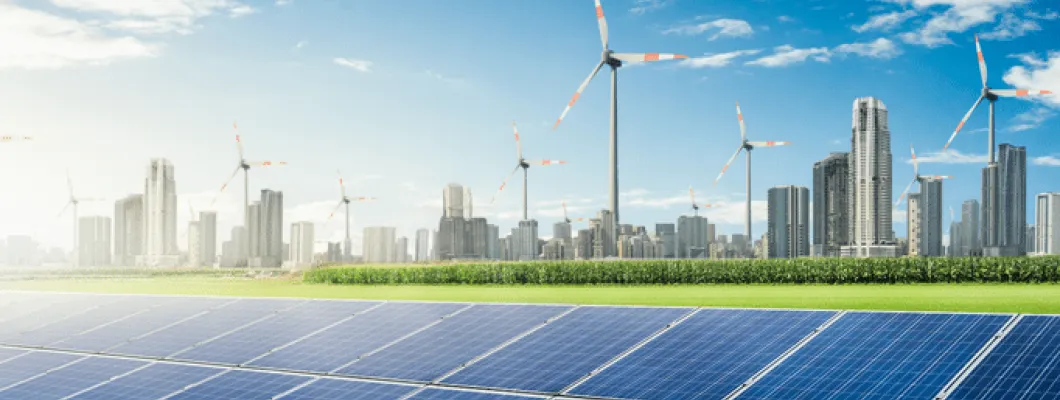Renewable Energy Sources

Renewable energy sources are natural, sustainable,
continuously replenishing, and inexhaustible sources of energy found in nature
without a specific limit. Unlike fossil sources, renewable energy sources do
not deplete over time. Resources such as oil, natural gas, and coal, which are
part of fossil energy sources, are non-renewable and can be depleted over time.
In contrast, renewable energy sources like solar, wind, water, biomass, and
wave continually renew themselves in nature before exhaustion. Renewable energy
sources harness natural resources and provide high sustainability energy.
What Are
Energy Sources?
After the Industrial Revolution, the increasing demand for
energy led to the use of harmful minerals such as oil, natural gas, and coal to
meet this demand. With technological advancements, renewable energy sources
were developed as alternatives to depleting energy sources. Today, two
different types of energy sources are still being used: depleting energy
sources and alternative energy sources.
What Is
Renewable Energy?
Renewable energy sources refer to resources produced from
natural sources that ensure continuous sustainability by nature. These sources
remain inexhaustible and can be used continuously. Renewable energy sources
persist indefinitely and are obtained from natural processes. The permanent
consumption of renewable energy is impossible. Due to the rapid renewal of used
resources, exhaustion or depletion is not an issue.
The
Importance of Renewable Energy Sources
Renewable energy sources, such as solar and wind, provide
unlimited usability without depletion, offering alternative energy solutions
over time. Intensively used non-renewable energy sources like coal, natural
gas, and gasoline should be replaced with highly sustainable, inexhaustible,
and self-renewing technologies. Environmentally friendly renewable energy
sources not only have positive economic impacts but also provide energy for
future generations. These sources contribute to low carbon emissions compared
to fossil fuels. Quickly self-renewing, they do not cause pollution and provide
clean energy. The use of renewable energy sources contributes to diversifying
energy needs and obtaining sustainable resources. For these reasons, renewable
energy sources play a crucial role in the future of energy needs.
What Is a
Renewable Energy Source?
A renewable energy source is a naturally self-renewing,
unlimited, environmentally friendly source of energy. These energy sources
minimize climate change with low carbon emissions. The use of renewable energy
sources is increasing in many countries.
What Are
Renewable Energy Sources?
Renewable energy sources are energy sources that can be used
without depletion or obtained from nature's resources. These sources include
solar energy, wind energy, hydropower, biomass, wave energy, and geothermal
energy. Unlike fossil fuels such as gasoline and oil, renewable energy sources
can be used sustainably and environmentally friendly. In addition to being
alternative energy sources, renewable energy sources are essential for a
low-carbon future, helping prevent global warming or climate change.
Solar
Energy
Solar energy is obtained from sunlight, making it one of the
renewable energy sources. This heat source is converted into electrical energy
through technologies such as solar panels and solar energy systems. Unlike
fossil fuels, solar energy is a low-carbon energy source. Solar energy can be
used in various areas, including homes, settlements, businesses, and
facilities. Solar energy systems in homes not only provide electricity but also
reduce energy consumption.
Wind
Energy
Wind energy derives its source from the sun. The pressure
difference created by the uneven heating of the Earth's surface causes wind.
Wind turbines are installed in regions where the wind is abundant to convert
kinetic energy into electrical energy. The amount of energy produced from wind
depends on the wind speed and frequency. Wind energy supplies 2% of the
electricity needed from renewable energy sources. Environmentally friendly wind
energy is obtained by installing wind turbines or windmills. Wind energy is
usually found in remote areas and can be connected to the grid.
Hydropower
Hydropower energy transforms water energy into electrical
energy. Renewable energy, such as hydropower, is clean and environmentally
friendly. This process is carried out through hydropower plants. In areas where
there is a high elevation, hydropower plants are established based on the rate
of flow of water. Some of the electricity produced today comes from hydropower
energy plants.
Biomass
Energy
Biomass energy is a type of energy obtained from the waste
of living animals and plants. This energy source is inexhaustible and can be
produced everywhere. Because of its significant contribution to socio-economic
developments, biomass energy is an important energy source, especially in rural
areas. Corn, wheat, animal excrement, manure, fruit, and vegetable waste
constitute the source of biomass energy. Although it is a renewable energy
source, biomass energy can have negative effects on humans and the environment
if developed uncontrollably.
Wave
Energy
Wave energy is a renewable energy source obtained from the
movements of oceans or seas. Wave energy is collected by wave energy converters
and converted into electrical energy. The wave energy converter is a device
that moves due to wave movements, generating electricity through this movement.
Wave energy is a renewable energy source, and due to the infinite wave movement
in the seas, wave energy is considered an endless source.
Geothermal
Energy
Geothermal energy is obtained by using the thermal energy of
underground hot water sources. This heat, present in the magma layer beneath
the Earth's crust, reaches the surface throughout the Earth's crust and emerges
as hot water and steam. Drilling is performed to utilize this heat in
geothermal energy production. Extracted sources are used in power plants to
produce electricity. Geothermal energy can be used not only for central heating
in homes and workplaces but also for electricity generation.
Advantages
of Renewable Energy Sources
Sustainable energy sources produce environmentally friendly
energy. Compared to fossil fuels, they emit low carbon, allowing for unlimited
energy without polluting nature. Sustainable energy sources are a safe energy
source for future generations. These infinite sources provide both economic and
environmental advantages.
 Become a Seller/Service Provider
Become a Seller/Service Provider
 Solution Center
Solution Center
 0850 309 51 23
0850 309 51 23
.png)





